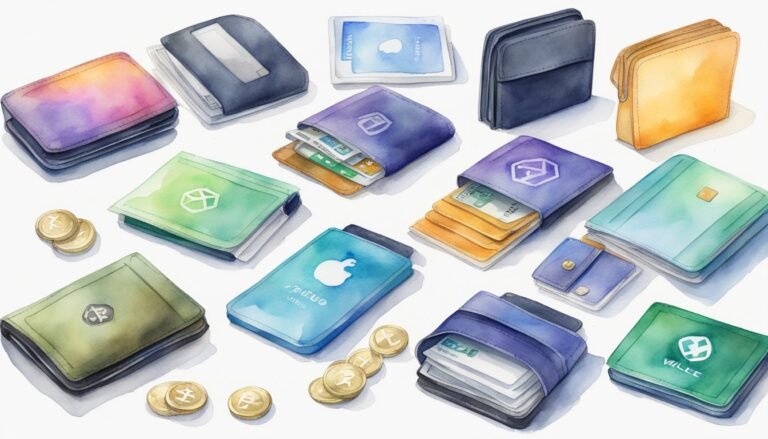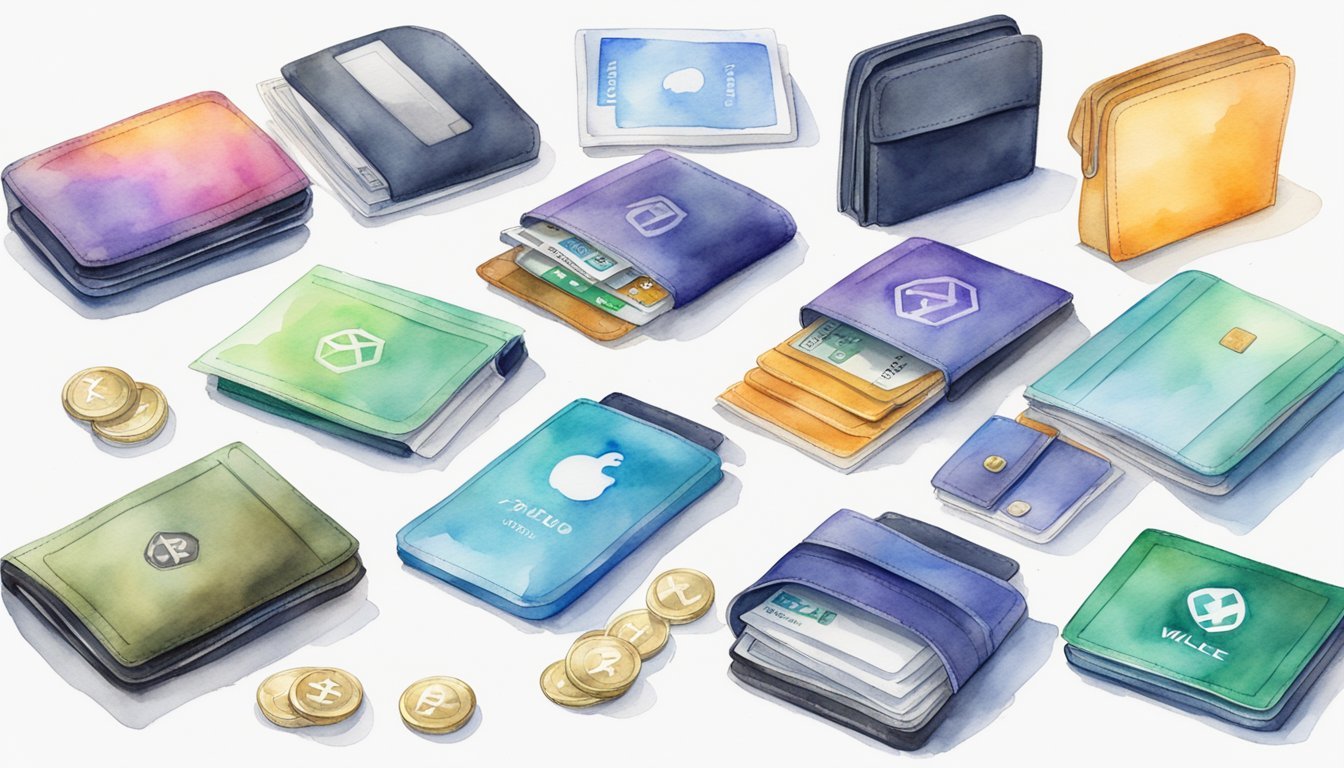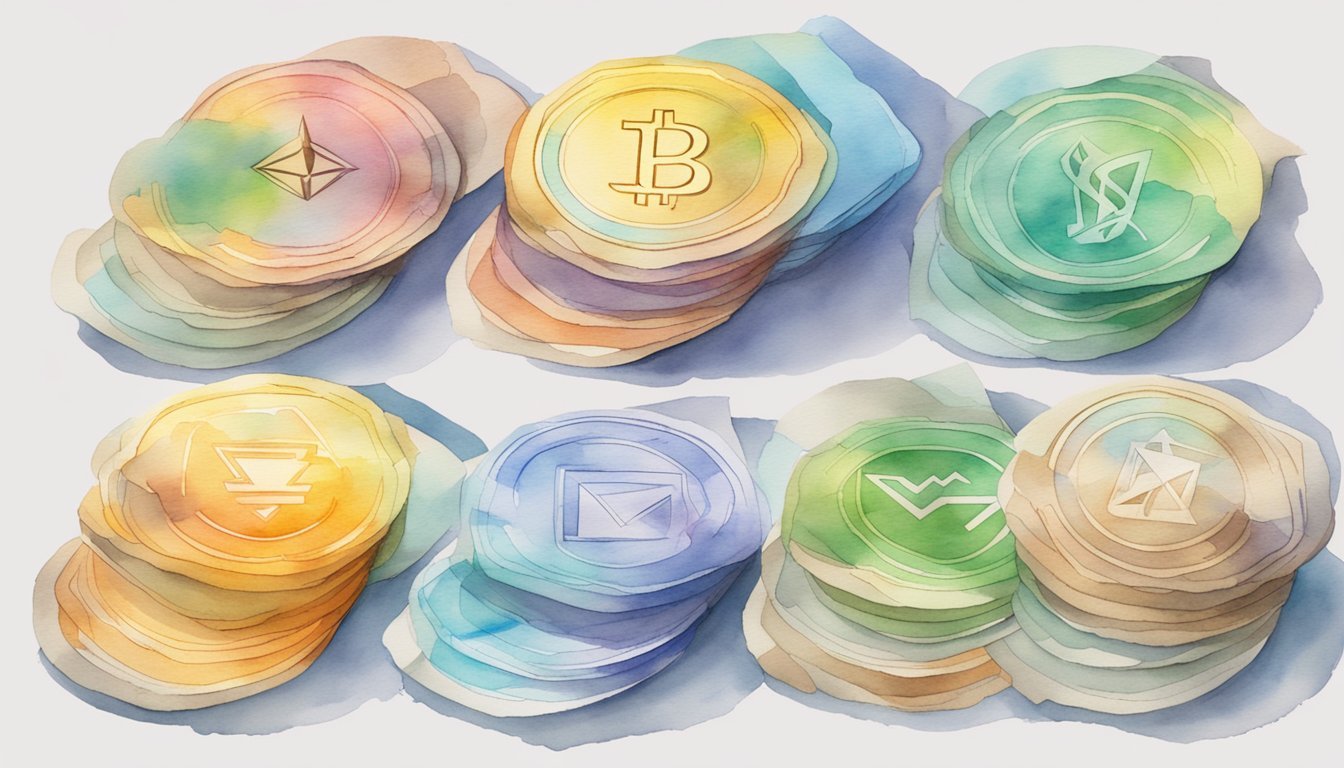4 Types of Crypto Wallets and Their Uses: A Practical Guide

Cryptocurrency wallets are essential tools for managing your digital assets.
They allow you to store, send, and receive cryptocurrencies securely.
With different types of wallets available, it’s important to know which one fits your needs.

Choosing the right crypto wallet can enhance your security and convenience. In this article, you’ll discover the four main types of crypto wallets and their specific uses.
1) Hardware Wallets
Hardware wallets are physical devices used to store cryptocurrency securely.
These wallets keep your private keys offline, protecting them from online threats.
When you use a hardware wallet, transactions are digitally signed within the device.
This ensures your private keys never leave the wallet, adding an extra layer of security.
Hardware wallets start around $30 and can go up to $100.
These devices are ideal for long-term storage of large amounts of cryptocurrency.
They are resistant to physical tampering and unauthorized access.
If your hardware wallet is lost, damaged, or stolen, you can still recover your assets.
Most wallets provide a unique recovery key, usually a 24-word phrase.
Though hardware wallets provide excellent security, they can be less convenient than hot wallets.
You need to connect the device to a computer or mobile device to access your funds.
Some popular options include Ledger and Trezor.
They cater to users who prioritize security and don’t need frequent access to their crypto.
For more information, you can read about hardware wallets on BitPay and Forbes.
2) Software Wallets
Software wallets are digital tools you install on your device.
They store your private keys and manage your cryptocurrencies.
These wallets are commonly used because they are easy to set up and convenient for daily transactions.
There are several types of software wallets.
Mobile wallets are apps you can download on your smartphone.
They are great for on-the-go usage.
Examples include Trust Wallet and Mycelium.
Desktop wallets are another form.
These are software applications you install on your computer.
They provide more robust security features.
Popular desktop wallets include Exodus and Electrum.
Some software wallets are standalone applications, while others are web-based.
Web wallets let you access your crypto from any internet-connected device.
These are convenient but can be less secure if the website is compromised.
Software wallets can be further categorized into hot and cold wallets.
Hot wallets are always connected to the internet, making them more accessible but also more vulnerable to hacks.
Cold software wallets store your private keys offline, adding a layer of security.
For example, a desktop wallet that is only occasionally connected to the internet can act as a cold wallet.
Some software wallets are custodial, meaning a third party holds your private keys.
Others are non-custodial, giving you full control.
Non-custodial wallets are preferred for better security and privacy.
For a more detailed guide on these wallets, you can check CryptoAtlas for an in-depth look.
Crypto wallets are a crucial tool in managing your digital assets efficiently.
Make sure you choose the one that best fits your needs and security requirements.
3) Paper Wallets

A paper wallet is a physical piece of paper with your cryptocurrency’s private and public keys.
These keys are often represented as QR codes, making it easy to carry out transactions.
Paper wallets are considered a form of cold storage, meaning they aren’t connected to the internet.
This makes them highly secure against online threats.
However, they come with their own risks, such as physical damage or loss.
Creating a paper wallet usually involves using a key generator program.
You can either write down the keys yourself or print them out.
It’s important to do this on an offline computer to avoid security risks.
Once you’ve created your paper wallet, you need to store it in a safe place.
This could be a safe deposit box or any secure location where it won’t be damaged or lost.
The biggest advantage of a paper wallet is the high level of security it offers for long-term storage.
Since it’s offline, it’s not vulnerable to hacks.
Be aware that using a paper wallet for frequent transactions can be cumbersome.
Each transaction requires you to manually enter or scan your keys.
If you’re looking for a highly secure way to store your cryptocurrency and don’t plan on moving it often, a paper wallet can be a great option.
Just make sure to follow best practices to keep it safe.
4) Mobile Wallets
Mobile wallets are software programs that you can use on your phone or any other internet-connected mobile device.
They are designed for convenience and accessibility.
With a mobile wallet, you can quickly access your crypto funds, send and receive payments, and check your balances on the go.
Your crypto isn’t stored in the wallet itself.
Instead, the wallet secures private keys that give you access to your funds on the blockchain.
This security feature makes mobile wallets a safe option for managing your cryptocurrency.
There are many popular mobile wallets available.
For example, MetaMask and Edge allow you to manage several major cryptocurrencies like Bitcoin and Ethereum.
These wallets are user-friendly and support buying, selling, and exchanging crypto directly from your phone.
It’s important to note that mobile wallets are a type of “hot” wallet, meaning they are connected to the internet.
This makes them more vulnerable to hacking compared to “cold” wallets, which are primarily offline.
Some mobile wallets like Coinbase Wallet store private keys locally on your device, giving you full control over your crypto assets.
This ensures that only you can access your funds, adding an extra layer of security.
When choosing a mobile wallet, it’s essential to consider the features that matter most to you.
Look for ease of use, supported cryptocurrencies, and security measures.
With the right mobile wallet, you can manage your crypto assets with confidence and ease.
Understanding Crypto Wallets
Crypto wallets are essential for storing and managing your digital assets securely.
Different wallets offer various features and levels of security, which can affect how you use and protect your cryptocurrencies.
What is a Crypto Wallet?
A crypto wallet is a digital tool that stores your private keys and allows you to manage your cryptocurrencies.
These keys are necessary to access and control your funds on the blockchain.
Without them, you cannot complete any transactions.
There are two main components of a wallet: the public key and the private key.
The public key is like an address that others use to send you crypto.
The private key is a secret code that you use to access and transfer your crypto holdings.
Without a wallet, you cannot safely store or use cryptocurrencies.
It acts as both a locker for your digital assets and a gateway for transactions.
Types of Crypto Wallets: Overview
There are four main types of crypto wallets: hot wallets, cold wallets, custodial wallets, and non-custodial wallets.
Each type has unique features and levels of security.
Hot wallets are always connected to the internet.
They are convenient for frequent transactions but can be vulnerable to hacking.
Examples include mobile wallets and web wallets.
Cold wallets are offline most of the time, which makes them more secure.
These include hardware wallets and paper wallets.
They require you to connect to the internet only when making transfers or trades.
Custodial wallets are managed by a third party, like a crypto exchange.
You rely on this third party to keep your private keys safe.
They are user-friendly but come with security risks.
Non-custodial wallets give you total control over your private keys.
They are safer but require you to take full responsibility for your keys.
If you lose them, you lose access to your funds permanently.
Understanding these different types can help you choose the right wallet for your needs and ensure your digital assets are kept safe and accessible.
For more details, check out the different types of crypto wallets and learn which is right for you.
Security Features of Crypto Wallets
When using crypto wallets, it’s crucial to understand their security features.
These include safeguarding your private keys and employing multi-factor authentication.
Private Keys and Public Keys
A crypto wallet uses two keys: a private key and a public key.
The private key is a secret number that allows you to spend your cryptocurrency.
It’s vital to keep your private key secure.
If someone gains access to it, they can control your assets.
The public key, on the other hand, is derived from the private key and serves as your wallet’s address.
You can share your public key with others to receive cryptocurrency.
For maximum security, never share your private key.
Encrypting your private key and storing it offline, such as in a hardware wallet, can add an extra layer of protection.
This reduces the risk of hacking or malware attacks.
Multi-Factor Authentication
Multi-factor authentication (MFA) is another essential security feature for crypto wallets.
MFA requires you to provide two or more verification factors to gain access to your wallet.
This could include a password, a fingerprint, or a one-time code sent to your phone.
By enabling MFA, even if someone has your password, they would still need the additional verification steps to access your wallet.
This greatly reduces the risk of unauthorized access.
MFA can be combined with other security measures like biometric verification or hardware tokens.
These layers make it harder for attackers to breach your wallet’s security.
In summary, both private keys and MFA play crucial roles in keeping your crypto assets secure.
Use them wisely to protect your investments.






